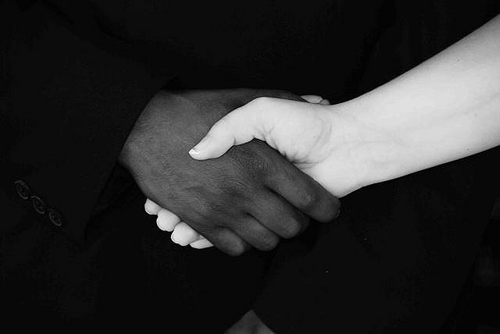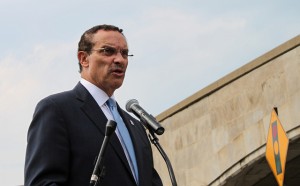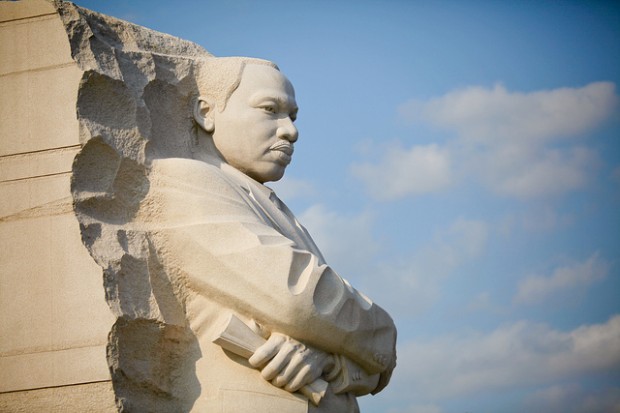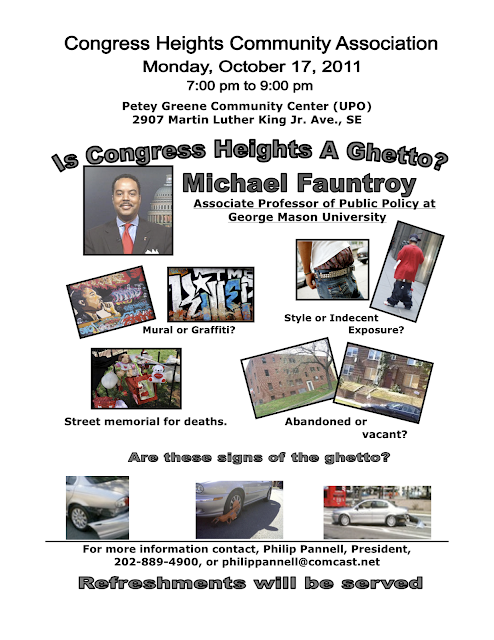We’ve discussed whether the Occupy protests are racially representative and efforts to address racial diversity. But, we must ask on more lighthearted note, where are the hipsters? Word is out there’s an officer dubbed “Hipster Cop” patrolling Occupy Wall Street, and The New York Times recently a chat with him. Has anyone seen a similar character down at Occupy DC?
Author Archives: Elahe Izadi
(Video) Deportations and Uncovering Hidden Abuses in Detention Centers
D.C. Mayor Vincent Gray signed an executive order Wednesday prohibiting police officers from questioning the immigration status of those arrested. This comes the day after the U.S. government announced it deported a record number of undocumented immigrants in 2011.
But the District may have to eventually implement Secure Communities, a controversial federal program that requires law enforcement officials to share arrest information with immigration officials. A new Frontline series focuses on Secure Communities, the deportation process and hidden abuses in immigrant detention centers. The program, “Lost in Detention,” was the result of a collaboration with American University’s Investigative Reporting Workshop
Reporter Maria Hinojosa recently spoke with PBS NewsHour’s Hari Sreenivasan about the possibility that more sexual abuse is taking place in detention centers than is reported. “If you’re an immigrant who is detained in a detention center,” Hinojosa said, “and you’re an immigrant with papers or without, if you are sexually assaulted by a guard while you’re in a detention center, you may not have any legal right to hold anyone accountable.”
You can watch the first part of the Frontline series below:
Royals Make a Home in the D.C. Area
Here’s another reason to love the D.C. area: we’re home to royalty! The Washington Post recently profiled a number of foreign royals from countries such as Ethiopia and Afghanistan. Many of those featured landed in our region because of political turmoil in their homelands. Some were born into their positions, but not all. Take Kofi Boateng, regional king of Ghana who represents the Washington area. He was elected by the Ghanian community in the D.C. area.
The Rise of Interracial Marriage
The changing attitude surrounding interracial marriages, which now make up 7.4 percent of all American marriages, was the subject of a recent NPR piece that aired on All Things Considered.
According to recent data, the least common pairing is between black women and white men, followed by white women and black men. The most likely interracial marriage is between Hispanics and non-Hispanics, followed by those between white men and Asian American women. So what does that tell us about race in America? From NPR:
“It reflects the status hierarchy,” says Roderick J. Harrison, a demographer at Howard University. “If you’re trying to marry up, clearly whites are it. If you’re trying to avoid marrying down, it would still look like blacks might be the least preferred.”
But even though a relatively small percentage of all American marriages are interracial, attitudes have changed much more rapidly in recent years. In 1987, 48 percent of Americans felt it was okay for whites and blacks to date. By 2009, it jumped to 80 percent. And in 2008, almost 15 percent of all new marriages were interracial, a record number according to the Pew Center.
D.C. is a diverse, vibrant city, and the number of multiracial people living here has increased by about 2 percent over the past decade. By 2010, about 17,316 D.C. residents were multiracial, about 7,000 of whom reported to be black and some other race.
What do you think: do attitudes in D.C. reflect the national increase in interracial marriages? Is it more accepted in D.C. than in other places or is there still a taboo? What have been your experiences with interracial dating and marriage?
ICE Deportations Reach Record Levels
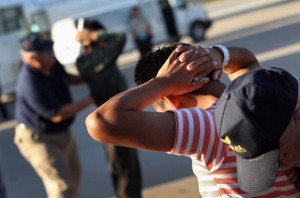
John Moore / Getty Images
Undocumented Guatemalan immigrants are body searched before boarding a deportation flight to Guatemala City, Guatemala at Phoenix-Mesa Gateway Airport on June 24, 2011 in Mesa, Arizona.
The United States has deported more people over the past fiscal year than ever before, according to U.S. Immigration and Customs Enforcement.
ICE deported 396,906 people between October 2010 and September 2011. About 55 percent of those deported had been convicted of felonies or misdemeanors.
“These year-end totals indicate that we are making progress, with more convicted criminals, recent border crossers, egregious immigration law violators and immigration fugitives being removed from the country than ever before,” ICE Director John Morton said in a press release.
ICE officials see the deportation numbers as positive, but the agency has come under heat for its recent practices, particularly over the controversial Secure Communities program. It directs local police departments to share finger prints and other arrest information with immigration officials. Critics say domestic violence victims and witnesses have been deported as a result, and that can foster distrust between immigrant communities and police. Federal officials have announced reforms, although there is still skepticism over how such changes will be implemented.
D.C. has yet to implement Secure Communities, but it may soon be mandatory around the country.
Gray’s Motives to Lessen D.C.’s Disparities Questioned
Mayor Vincent Gray has been touting his “One City” mantra since his election last year. He said the economic successes west of the Anacostia River haven’t extended eastward, where most residents are black and poor. “My intention is not to pit one part of the city against another,” Gray said during his State of the District speech in March.
But some are skeptical, saying that “One City” efforts will be to the detriment of those west of the river. Harry Jaffe, in criticizing Gray’s leadership in a Monday Washington Examiner editorial, wrote:
… I suspect that “One City” really means Gray intends to move more services and government offices east of the Anacostia River, to Gray’s home turf, at the expense of the city’s white, western wards. There’s talk, for example, that Gray might close the Department of Motor Vehicles office in Georgetown, so residents living west of Rock Creek would have to renew their licenses and handle other chores downtown or at Penn Branch, east of the Anacostia. So — one city based in Ward 7? If “One City” is code for moving even more services east of the Anacostia, just say so.
To this, D.C. political guru Chuck Thies sent out this tongue-in-cheek tweet:
What’s your take: do you think efforts to lessen racial and economic disparities will be at the expense of west of the river folks?
Organizing to Have a Say in Georgia Avenue Gentrification
Rather than wait to see what the forces of development will come up with for Georgia Avenue, a group of residents have organized to influence the future direction of the corridor. But as with gentrification in any community, the problem is being able to balance the desire to attract new residents and businesses while not displacing those who want to remain.
“Tonight’s Shooting In Congress Heights Does Not Defeat, Nor Define Us”
A man was shot and killed during a gas station robbery Monday night in Congress Heights. At the same time, local residents were meeting down the street for the “Is Congress Heights a Ghetto?” discussion.
MLK Memorial: A Complex D.C. Legacy
The Martin Luther King, Jr. Memorial, dedicated on Sunday as a tribute and reminder that King’s vision of equality isn’t yet fully realized, evokes an additional memory for those living in D.C. The statue is a reminder of the pain and frustration felt after King’s assassination, which gave birth to the 1968 riots that forever changed D.C.’s landscape, setting the stage for the gentrification the city is undergoing today.
One of Sunday’s speakers, president of the Children’s Defense Fund Marian Wright Edelman, shared this moving recollection from that moment in time:
The day after Dr. King was shot, I went into riot-torn Washington, D.C. neighborhoods and schools, urging children not to loot, get arrested and ruin their futures. A 12-year-old black boy looked at me straight in the eye and said, “Lady, what future? I ain’t got no future. I ain’t got nothing to lose.”
‘Is Congress Heights a Ghetto?’
The Congress Heights Community Association is hosting a talk tonight about whether the Ward 8 community is a ghetto, which can be a very loaded term. As local activist The Advoc8te points out, the flier includes images of Ward 8 Councilman Marion Barry’s car, which was allegedly damaged in a hit-and-run. He responded to reporters’ questions about the car by saying these things happen “when you live in the ghetto.’





